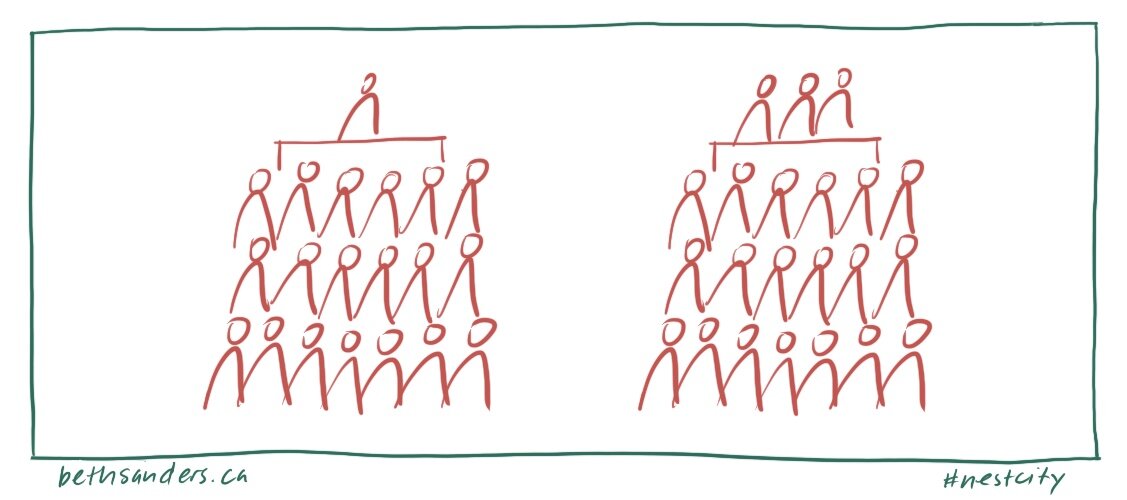What If We Are Not Planning to Survive?
Ten years ago this month, Alberta city and community planners, and a several friends in other professions and walks of life, gathered for our usual conference in an unusual way: no plenary speakers and no pre-arranged concurrent sessions and presentations. In contrast, we chose to grow our capacity to be in conversation with each other and the communities we serve, to identify what we wanted to learn, and to connect people with others who wanted to explore similar topics and questions.
My profession chose to invest in the professional development of our profession by training a hosting team of planners and planner-friends rather than a speaker who would zip in and out. We asked Chateau Lake Louise to prepare an unconventional conference room and we asked people to come prepared to explore two questions:
What if we’re not planning to survive?
And who’s planning our future anyway?
190 people explored these questions in large and small circles of conversation. They explored the metaphor of the elephant as metaphor and actively participated in their professional and personal learning journeys. The hosting team provided support, offering a minimal critical “process“ structure to explore those two big questions with methodologies like circle, open space technology and world cafe.
Participants documented their ideas and insights in ways that were transparent to everyone in the room; the highlights were documented and widely shared in our professional journal, dedicated to capture the essence of the gathering. We even had a big elephant on the wall.
Unconference highlights in the Alberta Professional Planners Institute journal
Shapes of conversation
We asked our colleagues to experience a different shape of conversation, and test the assumption that when one or a few people talk to a crowd about our communities that we are learning about community. We are not.
The dominant learning pattern in our world is the sage on the stage, the expert separate from the audience. There’s a time and place for this, but we are not good at discerning when the circumstances warrant special attention for one or a few people. This is our default shape:
Even if the subject matter is community, a conversation in this shape is not about community. It allows us to see, or visualize, a community of shared interest, but it does not allow us to create community. In this shape we are talking about community but not doing community, let alone making community.
When the purpose of a gathering is about community we should get to know each other; the community should get to know itself. If I leave a gathering having seen the faces of people who share my interests, but nothing else, then it was not about community. If I leave knowing names, knowing a bit (or a lot) about others, shared a bit (or a lot) about myself, found some new ideas together with others and thread some of those ideas together, then the gathering was about making community. Being in the same room, even if we are talking about community, is insufficient to claim that we are learning about community.
The Shift
I have lost my desire to be in learning spaces that claim to be about community when they are not. So when I find myself in teaching situations I put pressure on myself to create the seed conditions for community. This means I have a shift to make in my approach, as well as name the shift to the people with whom I am creating the learning habitat. The shift I must make is simple: from "me and community" to "me in community".
“The shift I must make is simple: from ‘me and community’ to ‘me in community.’”
“Me and community” means I keep myself removed and separate from the community and it's learning experience.
“Me in community” means I am embedded in the learning system.
A shift, from “me and community” to “me in community”, means making a transition from individual and separate learning journeys to interconnected learning journeys. We embrace learning together.
This acknowledgement of shifting from separateness to interconnectedness involves growing into new expectations of each other, new foundational assumptions about our learning habitat. For example, when I show up as the expert, we expect that I will speak uninterrupted about what I think. If we are at a conference, I speak for 30 or 60 minutes and then I get off the stage (and maybe leave the conference). There may be opportunity for a token exchange between you and I in the form of some questions and answers. I leave it to you to figure out what you think about what I've said by yourselves individually, not even as a group.
A community-focused way of learning involves a contrasting basic expectation: I share what I see and sense, and then we figure out what it means to us. I stay and explore with you. I might have a different role than you in the conversation that ensues, because I have a different experience, but I am in it with you. I do not drop a content bomb and run. I may have a role in holding space as the group discerns what it means for individuals, for the group, and any larger implications. I may jump in and participate with you while another holds space for us. The point: all of the perspectives in the room, all of the expertise, are allowed and invited to mix.
The Choice
When we learn only from “the expert” there are massive an unimaginable missed opportunities. This is what we should expect of ourselves: unimaginable possibilities when we set ourselves up to learn together, rather than alone. After all, when we are are not learning together, we are not planning to survive.
REFLECTION
Where are the places in your life where people are encouraged to learn together, rather than alone?
Where are the places in your city where people are encouraged to learn together?








